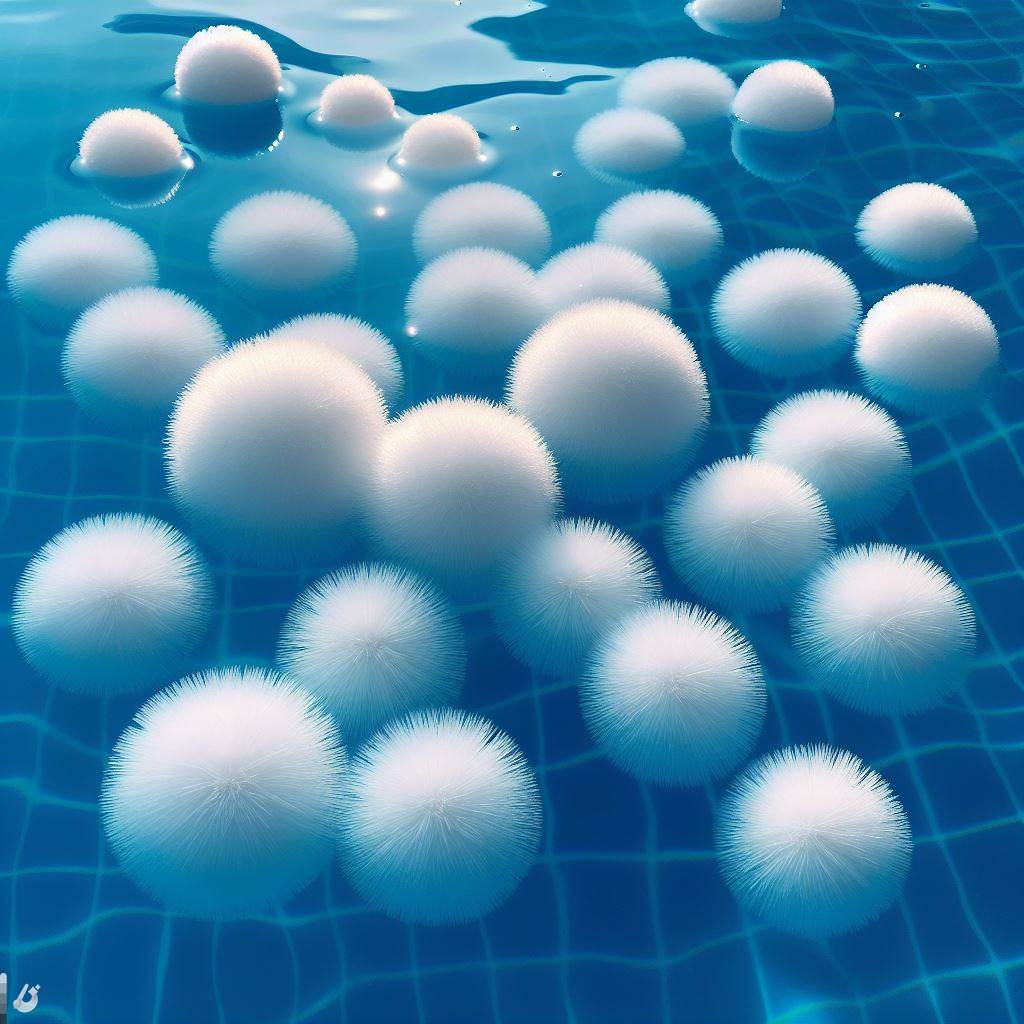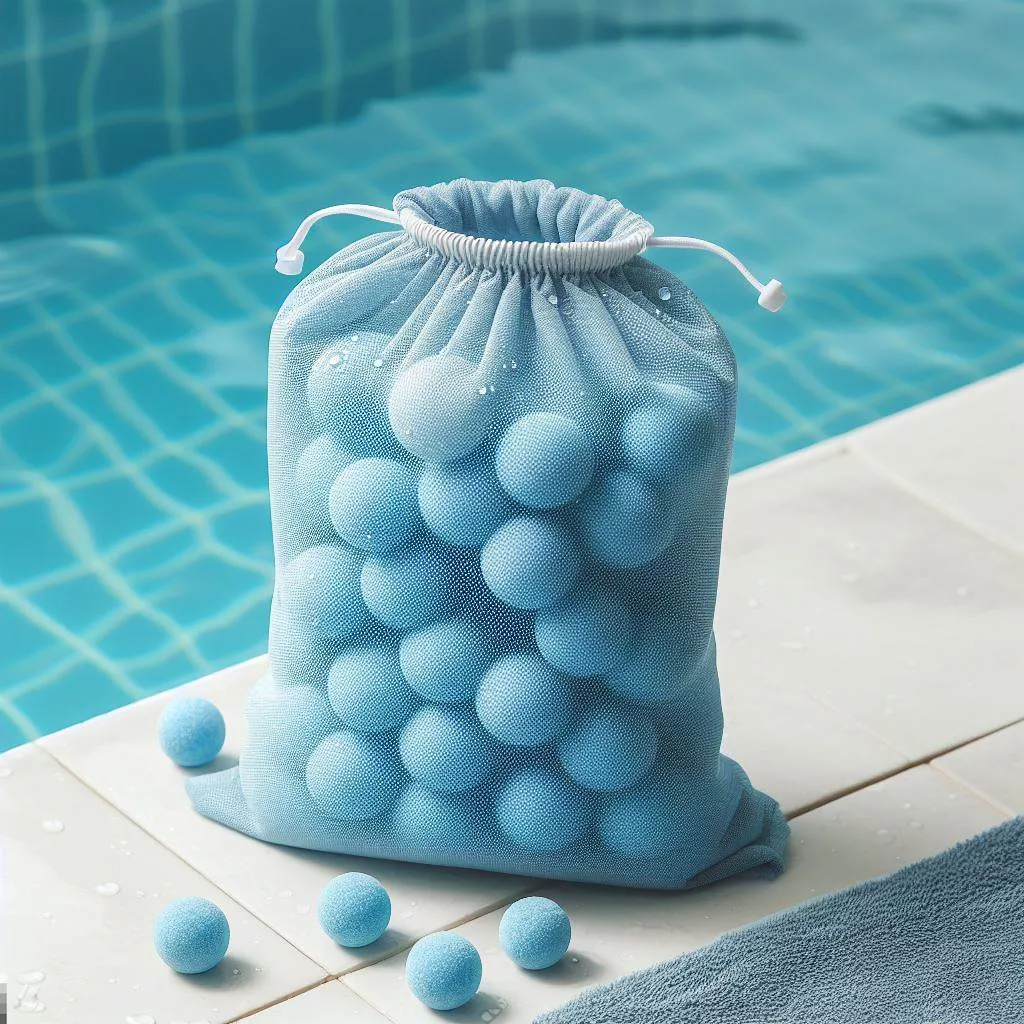Summer is here, and a refreshing pool is undoubtedly the best way to beat the heat. However, pools often encounter various issues that affect our swimming experience. Whether it’s cloudy water, algae growth, or bacteria overgrowth, these problems not only make the pool look unattractive but can also pose health risks. Don’t worry, we have solutions! Today, we will discuss how to use filter balls for sand filter to solve these common pool problems, keeping your pool crystal clear.
Solution for Cloudy Water
Understanding the Causes of Cloudy Water
Cloudy water is one of the most common pool problems. The causes of cloudy water are numerous, including suspended particles, algae, and chemical imbalances. These factors not only affect the pool’s appearance but can also damage pool equipment.
Using Filter Balls to Improve Water Clarity
Swimming pool filter balls are the ideal solution for cloudy water. Compared to traditional sand filter media, filter balls offer higher filtration precision, effectively capturing tiny suspended particles and making the water clearer. Additionally, filter balls have a longer lifespan, reducing the frequency of replacements and maintenance costs.
Steps to Follow
- Preparation: First, turn off the pool’s filtration system to ensure safe operation.
- Clean the Filter: If you are using filter balls for the first time, clean the old media out of the filter.
- Add Filter Balls: Evenly place pool filter cotton balls into the filter, ensuring the fill density is appropriate—neither too tight nor too loose.
- Restart the Filtration System: Check the filter’s seals to ensure no leaks, then restart the pool’s filtration system.
By following these steps, you will notice a significant improvement in the clarity of the water, making your pool water crystal clear.

Prevention and Control of Algae Growth
Causes of Algae Growth
Algae growth in pools is due to a combination of sunlight, warm water temperatures, and nutrients. Algae not only make the pool look dirty but can also make the pool surfaces slippery, increasing safety hazards.
Inhibiting Algae with Filter Balls
Filter balls for sand filter can effectively inhibit algae growth. These filter balls can filter out algae spores in the water and absorb nutrients through their micro-porous structure, blocking the environment algae need to grow. Additionally, the material of the filter balls has antibacterial properties, further reducing algae growth.
Tips for Use
- Regularly Clean Filter Balls: Check and clean the filter balls weekly to maintain optimal filtration performance.
- Combine with Algaecides: In cases of poor water quality or severe algae problems, use an appropriate amount of algaecide to enhance control.
- Maintain the Pool Circulation System: Ensure the pool’s circulation system runs for at least 8 hours daily to prevent stagnant water, which helps control algae.
By following these methods, you can effectively prevent and control algae growth in your pool, keeping the water clean.
Handling Bacteria and Microorganisms
Risks of Bacteria Growth
The growth of bacteria and microorganisms in pools can cause water quality issues and pose health risks. This is especially true in public pools, where bacteria spread rapidly, leading to skin diseases, eye infections, and other issues.
High-Efficiency Filtration of Filter Balls
Swimming pool filter balls offer high-efficiency filtration, effectively removing bacteria and microorganisms from the water. Their fine micro-porous structure captures particles smaller than sand, ensuring safe and hygienic water. Additionally, the antibacterial properties of filter balls enhance their effectiveness against bacteria.
Maintenance and Care
- Regular Replacement and Cleaning: Replace filter balls every 3 to 6 months, depending on usage frequency, to ensure effective filtration.
- Monitor Water Quality: Regularly test the chemical composition of pool water to maintain balance and reduce conditions for bacteria growth.
- Use Disinfectants: Combine with appropriate amounts of chlorine or other pool-specific disinfectants for dual protection of water quality.
These measures can effectively reduce bacteria and microorganisms in the pool, ensuring the health and safety of pool users.
Cost-Effective Maintenance Methods
Cost-Effectiveness Analysis of Filter Balls
Compared to traditional sand filter media, pool filter cotton balls not only have a longer lifespan but also offer better filtration performance. Although the initial purchase cost might be slightly higher, in the long term, filter balls reduce the frequency of replacements and maintenance costs, providing a high cost-performance ratio.
Saving Water Resources with Filter Balls
Filter balls consume less water during filtration, helping to conserve water. Additionally, filter balls can be cleaned and reused, reducing wastewater discharge and being environmentally friendly.
Future Developments and Technological Innovations
Innovations in Filter Ball Technology
With technological advancements, filter balls for sand filter are continually innovating. New filter ball materials not only offer higher filtration precision but also feature self-cleaning functions, further reducing maintenance workloads.
Integration with Smart Pool Management Systems
In the future, smart pool management systems will integrate with filter ball technology to achieve automated and intelligent pool maintenance. For example, sensors can monitor water quality changes and automatically adjust the filter’s operation to ensure optimal water quality.
Environmental Protection and Sustainable Development
The environmental properties of filter balls give them broad application prospects in future pool maintenance. As environmental awareness increases, more pool users will choose filter balls as their primary filter media, contributing to sustainable development.
Whether it’s cloudy water, algae growth, or bacteria overgrowth, these common pool problems can be effectively solved by using swimming pool filter balls. Filter balls not only provide high-efficiency filtration but also save water and reduce maintenance costs, making them an ideal choice for pool maintenance.

